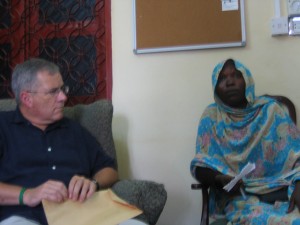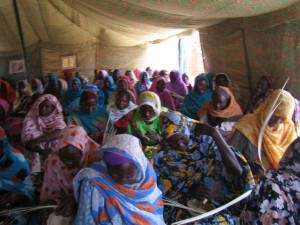
Special Envoy Gration listening to IDP leaders in El Fasher
The big takeaway for me from the trip to Darfur this weekend was that the Special Envoy is facing a communications breakdown.
In a situation like Darfur, where the IDPs in the camps are so networked into the global media and advocacy organizations this messaging problem is no superficial matter – it has a substantive impact on Gration’s work. For example, I would say he spent 85% of his first day in Darfur having to repeat three messages:
1) I never said Sudan should be lifted from state sponsors of terror;
2) I never said sanctions should be lifted from Khartoum;
3) I never said IDPs have to leave the camps now.
And at the end of all that, my sense is that the IDPs still didn’t believe him (in two of the sessions they clapped when he said [ I’m paraphrasing] – I never said IDPs have to leave the camps now and I believe you should only leave the camps voluntarily and when conditions are such that you can do so with your human rights ensured and with dignity. But in one of those same sessions, I had women tell me privately afterwards that they do not accept his apology, do not believe him, and want him to resign.)
In short, while it was vital for him to come to Darfur now and try to correct this, it will take much more than one short stop at a few locations around El Fasher for the IDPs to rebuild any sense of trust in him.
After the trip I went back and read over Gration’s testimony before the Senate Committee on Foreign Relations. He is right that he never said he thought Sudan should be removed from the State Sponsors of Terror list. But it’s also true that he didn’t say they shouldn’t be removed from it. He didn’t say that sanctions should be removed from Khartoum specifically – but he did talk about needing to reconsider the approach to sanctions in order to assist people in the south and Darfur. On the topic of returns, he never said people should be forced to return. What he talked about was ensuring “displaced people, persons, can return to homes when they want to and where they want to.” I wonder if part of this problem is due to the fact that a man who has spent the majority of his career in the Air force has been put into this environment where not only everything he says, but also everything he does not say, is scrutinized to the -enth degree.
This trip gave the IDPs a chance to vent their anger, but Gration telling them that he did not actually say what they think he said is not enough because they are now too skeptical of him to absorb his efforts at clarification. There is a huge disconnect between him and the IDPs that needs to be fixed. This is especially the case if he wants to pursue his laudable approach of putting civil society at the front and center of any solution – a place they have never been over the course of the past 6 years of Darfur policy.

Women weaving baskets at Abu Shok
I wonder if the way forward might involve assigning someone to manage relations with the IDPs fulltime. Gration’s job is plenty large enough that you could assign him ten additional people and they would all have work to keep them busy 24/7. Not only is he dealing with Darfur, but also North-South, the proxy war between Chad and Sudan, the role of neighbors like Egypt and Libya – and that’s even before you get onto the elections and the referendum. Something along the lines of assigning someone to go and spend the bulk of his or her time on the ground in Darfur could be the kind of circuit breaker that is helpful at this point . . .









[…] mistrust of the government and preventing their return home . . .” As I have written in other posts, this was perhaps the biggest problem I noticed on the trip – a complete disconnect between […]